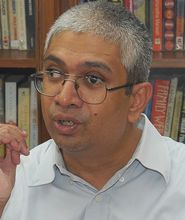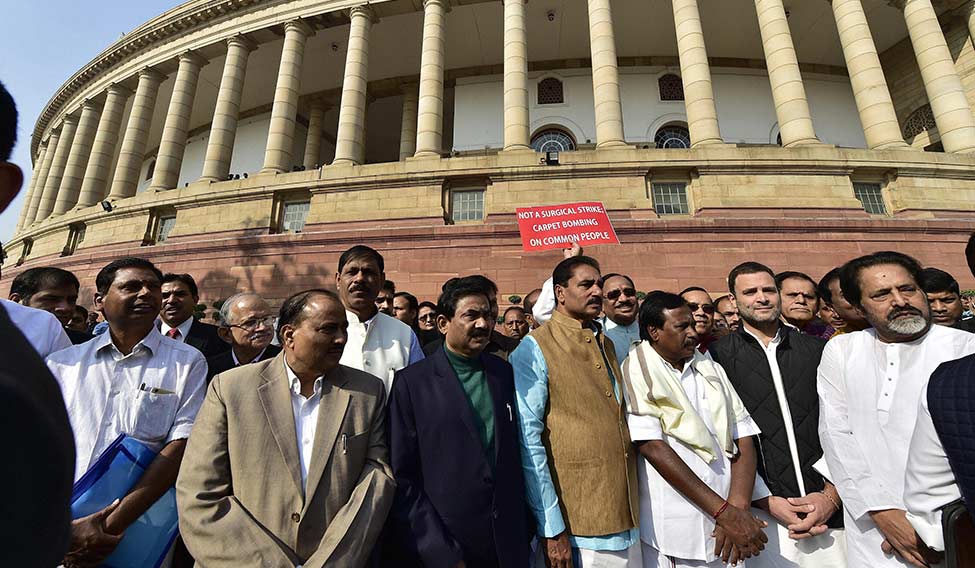
Parliament has hardly functioned in the winter session as opposition parties and the government argued over the particular rules under which demonetisation would be discussed. This is not an unprecedented phenomenon—the winter session of 2010 was fully wiped out on the mode of discussion on 2G spectrum allocations and the demand for a joint parliamentary committee. Indeed, one can see a trend over the last couple of decades of Parliament abdicating its role as the principal institution of representative democracy.
The first three Lok Sabhas saw 125 to 140 sittings a year. This has declined to 60 to 70 a year in the last three Lok Sabhas. Furthermore, a significant amount of time is lost to disruptions. For example, the 15th Lok Sabha (2009-2014) worked for only about two-thirds of the planned time. The lower amount of working hours has affected some of the key functions of Parliament, such as holding the government to account for its actions and scrutinising legislative bills and budget proposals. During the 15th Lok Sabha, 61 per cent of question hour was wasted, and hence just 15 per cent of the questions listed for oral answers received a verbal reply and supplementary questions. Over a fourth of all bills were passed with hardly any discussion, and only a fifth of the bills were discussed for three hours or more. Most of the budgetary grants are sanctioned without scrutiny on the floor of the house—in the 15th Lok Sabha, on average, less than 15 per cent of the Union budget expenditure was discussed.
The situation in the state assemblies is worse. Most assemblies sit for fewer than 30 days a year. Some such as Haryana have averaged about 12 days a year over the last five years. Most bills are passed without discussion, often on the same day that the bill is introduced.
These trends are not healthy for a democratic republic. One of the core ideas underlying our Constitution is that of checks and balances. It is the role of the legislatures—as elected bodies—to oversee the functioning of the government. A failure to do so can lead to lower accountability over the executive. This can occur in several different ways. For example, the legislature is expected to monitor implementation of policies, and in the absence of oversight, the executive may not just get away with poor implementation but also subvert the intent of the policy. Another example is the framing of rules. Most Acts delegate rule-making powers to the executive, which allow for flexibility, but require the rules to be within the limits of the Act. They also require the rules to be tabled in the legislature and provide for a discussion. During the 15th Lok Sabha, just three such rules were discussed in Parliament (all in the Rajya Sabha), and none have been discussed in the 16th Lok Sabha till date.
The vacation of its legitimate space by the legislative bodies has also led to a greater role undertaken by the judiciary. Judges have been holding the executive to account for their policy decisions and implementation. Several examples come to mind, such as the setting up of food commissioners by the Supreme Court to monitor effective implementation of the public distribution system, and direct monitoring of sealing of residential property used for commercial purposes in Delhi. The courts have effectively made laws in cases such as that for protecting women from sexual harassment. One can argue that all these are core functions of the legislature.
There is a greater concern for democracy. In a democracy, the state has legitimacy due to periodic elections that empower people to elect their representatives as legislators. The legislators, thus elected, are expected to work towards public welfare through their legislative activity. The first part of this compact works well—elections are free and fair, and voter turnouts are higher than in many mature western democracies. If the legislators are not seen to be performing their functions, citizens can vote them out in the next elections. However, if the second part doesn’t work well over a sustained period of time, ie, the legislatures do not function, there is a risk of people losing faith in the democratic process. This is not a far-fetched idea—several other post-colonial nations have seen such periods.
Therefore, there is urgent need to address some of the key shortcomings that lead to this situation. The most important of these is to increase the agency of the individual legislator. In India, people vote for a candidate who (usually, but not necessarily) contests on a party ticket. One can argue, as Edmund Burke did, that the role of the elected representatives is to debate and discuss issues using reason and then vote for what each person believes best serves public interest. Alternatively, one can say that the elected representative should act on behalf of their voters and act in their interest. In either case, that decision may differ from that decided by the party leadership.
However, in India, the anti-defection law mandates that each legislator has to follow the party whip on every issue, failing which they could lose their parliamentary seat. This implies that the elected member is just a number to be counted upon by the party during the vote. This removes the incentive for members to examine each issue in detail, understand the nuances, and negotiate a position between conflicting interests and objectives. After all, why should one put in the effort if one has to just follow orders during the vote? Even the argument that the anti-defection law helps form stable governments lacks merit. Such an argument would be valid if the law were restricted to confidence motions and money bills, as a government that loses such votes will have to resign. However, the anti-defection law applies to all votes, and even to members of Rajya Sabha, ie, to votes that do not have the continuation of the government at stake. Therefore, there is a strong case for repealing this law, or at the very least, restricting it to confidence motions and money bills. It is revealing to note that just five other countries have a similar law—Pakistan, Bangladesh, Guinea, Sierra Leone and Zimbabwe.
A second move to empower the legislature would be to give it powers to convene itself. Currently, Parliament is convened by the president on the advice of the council of ministers. That is, the executive decides when the body that oversees its functioning, the legislature, will meet. It would be useful for Parliament to set a calendar of meetings. In addition to the scheduled meetings, there needs to be a provision that it needs to be summoned if a significant minority of members desires so.
A third step would be for Parliament to evolve practices that foster greater accountability of the executive. For example, the items to be discussed and the mode of debate (whether it would have a vote) are decided by consensus of all parties, and the government can block discussion on issues that may embarrass it. This can be addressed in several ways—allocate a day every week where the opposition decides the topic of discussion, or require a discussion if a significant minority (say 20 or 25 per cent of the membership) demands one.
A fourth area would be to strengthen the working of parliamentary committees. Currently, bills are referred to committees for examination only with the consent of the minister. In the current Parliament, only about a third of the bills introduced have been referred to committees. It would be useful to require all bills to be referred to committees, with rare exceptions made by the house in case of an urgent matter. Committees also need to be supported by specialised researchers. Also, they should have the power to summon ministers to explain executive decisions; currently, they can summon only civil servants and not the political executive.
Importantly, Parliament should look into the issues that are highlighted by the judiciary. If there is a lacuna in the legal code (such as the absence of a law to protect women from sexual harassment at the workplace), Parliament should act to fill the gap. They should also perform their duty of overseeing the executive so that courts do not fill the void by creating monitoring bodies.
In sum, Parliament and state legislatures are key institutions of democracy that give legitimacy to all other institutions. It is important to increase their effectiveness as representative bodies of lawmaking and accountability.
The writer is president and co-founder, PRS Legislative Research, New Delhi.






